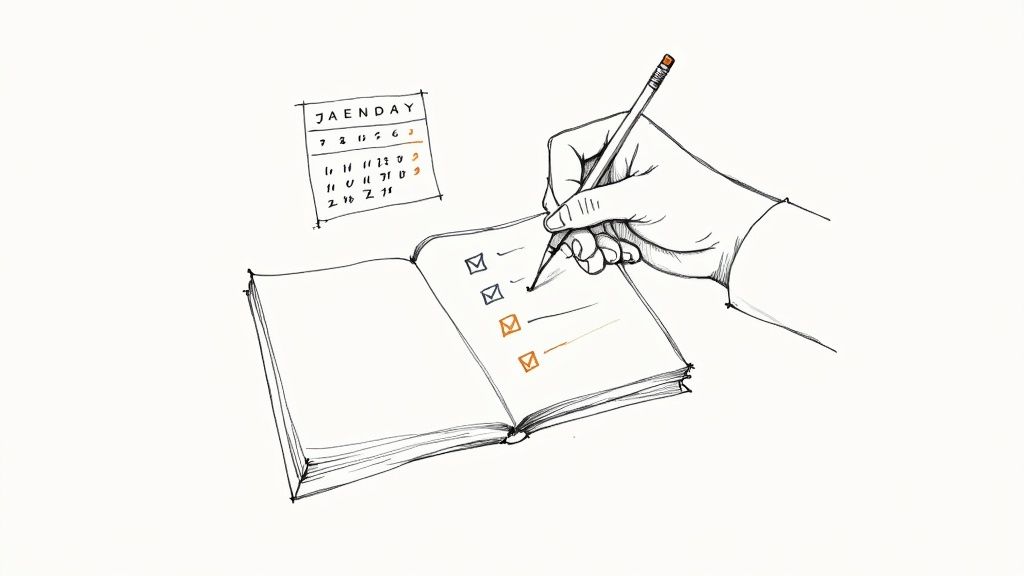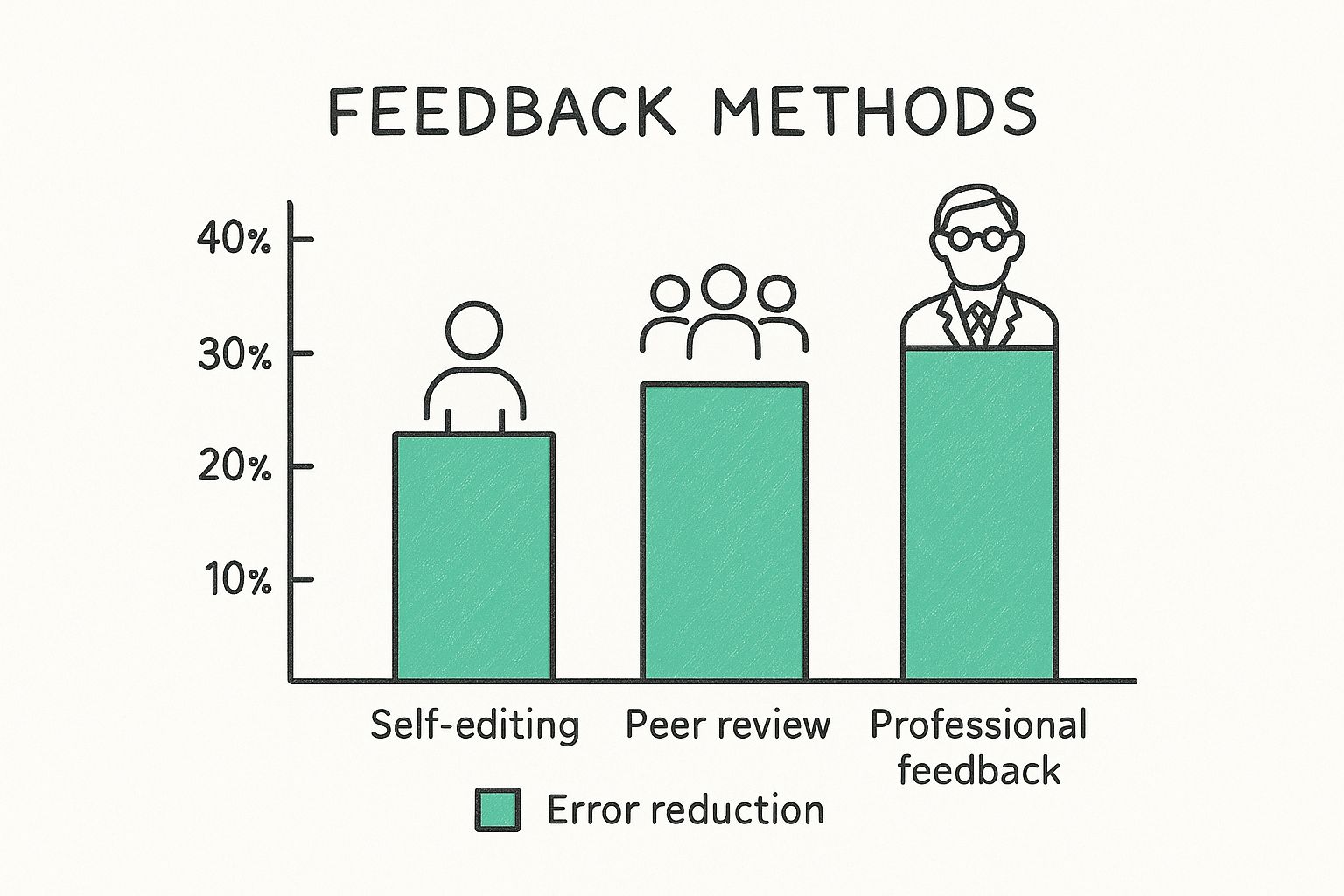How to Improve English Writing Skills: Top Tips for Content Creators

If you want to improve your English writing skills, it all comes down to two simple habits: reading great material and writing something—anything—every single day. These aren't just empty tips; they are the foundational practices that wire your brain for better sentence structure, a richer vocabulary, and more authentic communication.
Build a Strong Foundation for Writing

Getting good at writing isn't about memorizing every grammar rule from a dusty textbook. It's about developing sustainable habits that make English a part of your daily routine, shifting the process from a chore to a manageable, even enjoyable, part of your day.
Think of it like learning an instrument. You wouldn't expect to nail a complex solo just by reading music theory; you have to practice consistently. Small, daily actions build the muscle memory you need for clear, fluent expression.
Create a Habit of Daily Reading
Reading is arguably the most powerful—and enjoyable—way to improve your writing. When you consistently read well-crafted material, you start to absorb the rhythm and flow of effective communication almost by osmosis.
You'll begin to internalize complex sentence structures, pick up new vocabulary, and see firsthand how punctuation creates pace and emphasis. This isn't about intense study; it's about exposure. The more you read, the more you develop an intuitive feel for what "sounds right."
The Power of Consistent Writing Practice
Right alongside reading, daily writing is an absolute must. And no, that doesn't mean you need to produce a full-blown article every day. The real goal here is consistency, not a massive word count.
A short, daily writing habit—even just 15 minutes of journaling or summarizing an article—is far more effective than one long, stressful session per week. It keeps your mind sharp and builds momentum.
This low-stakes practice helps you get over the fear of a blank page and builds genuine confidence. You simply get more comfortable turning your thoughts into words, which is the heart of all writing. This approach is powerful for everyone, and students can find more strategies in our guide on how to improve academic writing.
This isn't just anecdotal. The 2020 EF English Proficiency Index, analyzing data from 2.2 million test-takers, highlighted that practical communication skills and daily use were the biggest drivers of improvement—not rote memorization. You can find more on those findings at VOA Learning English.
Designing Your Practice Schedule
To make these habits stick, you need a simple, realistic schedule. Find small pockets of time you can commit to daily. Here are a few ideas that have worked for many writers:
- Morning Pages: Spend 10-15 minutes writing down whatever comes to mind as soon as you wake up. It’s a great way to clear your head and get words flowing.
- Lunchtime Reading: Use 20 minutes of your lunch break to read a chapter of a book or a long-form article from an industry leader.
- Evening Summary: Before bed, take five minutes to write a three-sentence summary of your day or an interesting idea you came across.
To help you get started, here’s a quick table outlining some easy-to-implement daily habits.
Daily Habits for Writing Improvement
This table summarizes a few simple, high-impact activities you can weave into your daily routine to build a solid writing foundation.
| Activity | Recommended Time | Key Benefit |
|---|---|---|
| Morning Freewriting | 10–15 Minutes | Overcomes writer's block and builds confidence. |
| Active Reading | 20 Minutes | Absorbs sentence structures and vocabulary passively. |
| Daily Journaling | 10 Minutes | Practices translating thoughts into clear prose. |
| Summarize an Article | 15 Minutes | Sharpens clarity and conciseness. |
By committing to just one or two of these small activities, you'll be laying the groundwork for all your future writing success without feeling overwhelmed. This foundation is what everything else is built on.
Master Grammar and Sentence Structure
Great grammar is the invisible scaffolding that makes your writing stand up, giving your ideas credibility and punch. But you don't need to become a grammar scholar to write well. The real goal is to get an intuitive feel for what sounds right.
Think of it like cooking. You can memorize recipes, but a great chef understands why certain flavors work together. Once you grasp the logic behind sentence structure, you can build paragraphs that are not just correct, but truly compelling.
Deconstruct Sentences from Writers You Admire
One of the best ways to learn is by taking things apart. Find a writer you genuinely enjoy reading—it could be a blogger, a journalist, or a novelist whose style just clicks with you. Then, instead of just consuming their work, deconstruct it.
Pick a paragraph and go through it line by line. Ask yourself:
- How do they mix up sentence length? You’ll notice they use short, direct statements for impact and longer ones to add detail.
- What punctuation are they using? Look past the basics. Are they using em-dashes for emphasis or semicolons to link related ideas?
- How are the sentences built? Do they always lead with the subject, or do they use an introductory phrase to build suspense?
This isn't about rigid analysis; it's about absorbing the techniques of writers you respect. You start to see grammar less as a set of rules and more as a creative toolkit.
Focus on the Grammar Rules That Actually Matter
You can drive yourself crazy trying to master every obscure grammar rule. A much better approach is to focus on the ones that have the biggest impact on clarity and professionalism. Honestly, if you nail just a few key areas, you'll fix the vast majority of common mistakes.
Here are the big ones we always tell people to prioritize:
- Subject-Verb Agreement: Make sure your subjects and verbs match. It’s "The team is ready," not "The team are ready." This small detail instantly signals polished writing.
- Consistent Verb Tenses: Don't bounce between past and present tense without a good reason. Keeping tenses consistent makes your narrative much easier to follow.
- Punctuation That Clarifies: Mastering commas, apostrophes, and semicolons can completely change a sentence's meaning. Learning the difference between "its" and "it's" makes a big difference.
Pro Tip: Read your writing out loud. Seriously. Your ear will catch awkward phrasing, clunky sentences, and grammatical slip-ups that your eyes just skim right over.
Use Technology as Your Grammar Coach
Even the most seasoned writers have off days. Modern tools are fantastic for catching mistakes, but when you use a grammar checker or AI assistant, don't just mindlessly click "accept." Pause for a second and understand why it's suggesting a change.
When you do that, you turn a simple spellcheck into a mini-lesson. The key, though, is to not let AI write for you. Relying on it to generate entire drafts can suck the personality right out of your work and can be flagged by AI detectors.
That's why we built PureWrite. You can use AI to get your initial ideas down, then run the text through our platform to humanize it, ensuring it sounds authentic and connects with your readers. It's an ethical way to use AI without losing your unique voice.
Ready to see the difference? Try PureWrite today to turn your AI-assisted drafts into polished, human-sounding content.
Expand Your Vocabulary and Refine Your Style

Once you've got the rules of grammar down, you can start having real fun with your writing. This is where you graduate from simply being "correct" and start developing a style that has personality and flair.
This next level is all about intentional word choice. You’re not just trying to sound smart; you’re picking the exact word to convey a specific meaning, emotion, or image. This is what breathes life into your ideas.
Building a Practical Vocabulary
Forget about memorizing long lists of obscure words. The best way to build a useful vocabulary is to pay close attention to the words you come across in your daily reading. When a word makes you pause, don’t just skip over it.
Look it up, understand its nuances, and then challenge yourself to use it. We recommend keeping a simple vocabulary journal—a note on your phone will do the trick.
When you find a new word, jot it down with its definition and a sentence you wrote. The act of creating your own context is far more effective for memory than just reading a dictionary entry.
This simple habit turns passive reading into an active learning exercise. Soon, you'll have a rich toolkit of words that you genuinely understand and can weave into your work with confidence.
Using a Thesaurus with Intention
A thesaurus is a powerful tool, but it can be dangerous. Used without care, it can make your writing sound clunky and unnatural. The goal isn't just to find a different word; it's to find the perfect word.
Take a simple word like "good." Swapping it for "excellent" works, but what about other options? "Benevolent" suggests kindness. "Proficient" points to skill. Each synonym carries its own unique flavor.
Think about the subtle differences:
- "Happy" is a general state.
- "Jubilant" feels like a triumphant celebration.
- "Content" is more of a quiet, peaceful satisfaction.
- "Ecstatic" conveys an almost overwhelming joy.
Choosing the right synonym adds layers of precision and emotional depth. This skill is critical everywhere, from ad copy to daily emails where following email communication best practices can make or break a relationship.
Finding Your Authentic Writing Voice
Your writing voice is your personality on the page. It's that unique combination of tone, rhythm, and word choice that makes your work instantly recognizable. Developing it is about experimentation and discovering what feels right.
Start by playing with your sentence structure. Try mixing short, punchy sentences with longer, more flowing ones. A few short sentences can create urgency, while a long one can paint a vivid picture.
Your tone is another massive piece of the puzzle. Are you aiming for a formal, authoritative tone for a research paper, or a casual, friendly one for your blog? Your words, sentences, and punctuation all shape that tone.
How AI Can Help Refine Your Style Ethically
AI writing tools can be incredible partners in this process, but you have to use them correctly. Letting an AI generate a first draft can save time, but that raw output almost always lacks a human touch. Studies show AI-generated text often falls into predictable patterns that feel sterile.
This is where you come in. Instead of just copy-pasting what the AI gives you, treat it as a lump of clay. It’s your job to shape it—to inject your unique perspective, add personal stories, and tweak the rhythm until it sounds like you.
We designed PureWrite for this exact purpose. You can feed it an AI-generated draft, and our tool will help you humanize it. It flags robotic phrasing and helps you adjust the tone, ensuring the final piece has your authentic voice.
This ethical approach lets you get the efficiency benefits of AI without sacrificing personality. Try PureWrite and see how it can help you polish your work and develop a style that truly resonates with your audience.
Embrace Practice and Constructive Feedback
Knowing grammar rules is one thing, but real improvement comes from actually using them. The true test of your writing skills happens when you put your words out there, again and again, and learn from the response. The writer's essential loop is: create, get feedback, and revise.
Think of it this way: you can study a map for hours, but you only really learn the route by driving it. Low-stakes practice, like keeping a personal blog or a private journal, gives you a safe space to experiment without pressure.
The Power of Consistent, Low-Stakes Practice
Regular writing builds muscle memory. The more you do it, the easier it becomes to structure your thoughts and find your voice. This is especially true in a professional setting.
For example, writing daily internal updates is a fantastic way to practice being clear and concise. A content creator could practice by writing a short social media post each day. We dive deeper into professional strategies in our guide on how to write professional emails.
Viewing feedback not as criticism but as a gift is a transformative mindset. It helps you become more self-aware, spot your blind spots, and continuously refine your craft.
This continuous cycle of practice and refinement does wonders for your confidence. A 2018 study from Udayana University found that when students engaged in performance-based writing, their interest in the subject jumped by 92.85%, and their self-esteem improved by 85.71%. It’s proof that seeing yourself get better is a huge motivator.
Seeking and Applying Constructive Feedback
Putting your work out there can feel intimidating, but honest feedback is the fastest way to level up. The trick is to find feedback that’s specific, actionable, and genuinely meant to help you grow.
There are many ways to get this input, and each has its own benefits. This infographic breaks down how different review methods stack up when it comes to catching errors.

As you can see, editing your own work is a good first pass, but getting a fresh set of eyes on it—whether from peers or professionals—makes a much bigger difference.
How to Find (and Use) Great Feedback
Finding reliable sources for constructive criticism is a game-changer when you're learning how to improve English writing skills. You don't always need to hire a professional editor; often, a trusted colleague or mentor is all you need.
Here are a few places to find quality feedback:
- Peer Review Groups: Team up with a few other writers or colleagues who share your goal of improving. You can agree to review each other's work honestly.
- Mentors or Managers: In a professional setting, a manager or a senior team member can offer invaluable feedback on your writing's clarity, tone, and impact.
- Online Communities: Platforms like Reddit have active writing communities where you can post your work and get critiques from a wide range of people.
When you get feedback, fight the natural impulse to get defensive. Instead, listen with an open mind and ask questions to understand their point of view. Not all advice will be gold, so learn to apply what makes sense and get back to writing.
Use Technology to Elevate Your Writing

Today's writing tools are incredible. They're no longer just about catching typos; they can act as a personal writing coach, helping you genuinely sharpen your skills. Let's look beyond the basic spell-check and see how modern tools can give you deep insights into your own work.
These platforms can pinpoint complex grammatical issues and offer smart stylistic improvements. This is especially important if you're using AI for a first draft—the biggest challenge then becomes keeping your authentic, human voice.
Beyond Spell-Check: Advanced Grammar and Style Tools
Modern grammar checkers do more than just flag a misplaced comma. They dig into your sentence structure, analyze your tone, and check for clarity, teaching you the principles of strong writing. Think of them as a second pair of eyes that can catch the subtle stuff you might miss.
For instance, a good tool won't just tell you a sentence is in the passive voice. It will suggest an active alternative and explain why the change makes your writing more powerful. Before you know it, you’ll start recognizing these patterns on your own.
The trick is to treat these tools as learning aids, not crutches. Whenever you get a suggestion, take a second to understand the "why" behind it. That simple correction just became a valuable micro-lesson.
These tools are getting scarily accurate. A 2024 study on AI models found one grammar correction system achieved a 63.24 GLEU accuracy score, with its evaluation only 0.35 points different from human experts. This shows today’s tech can provide feedback nearly on par with a professional editor. You can dig into the findings on AI-driven writing enhancement yourself.
Ethical AI Usage for Authentic Content Creation
AI writing assistants can be a lifesaver for smashing through writer's block or structuring ideas. But let's be honest—raw AI-generated text often feels flat. It lacks the nuance, rhythm, and personal touch that connects with a reader, and is easily flagged by AI detectors.
That's why the final, most important step is always yours. Your job is to take that AI-generated foundation and weave in your unique perspective and style. This is how you remain the true author, using AI as a collaborator, not a ghostwriter.
To help with this crucial process, we built PureWrite. Our platform was designed to bridge the gap between AI efficiency and human authenticity. You can paste in your AI draft, and our tool analyzes it for robotic phrasing, giving you clear suggestions to make it sound genuinely human.
Choosing the Right Tools for Your Needs
With so many options out there, it’s easy to get overwhelmed. The key is to pick tools that match what you’re trying to accomplish. To help you get a lay of the land, here’s a quick look at the types of tools available and what they do best.
Essential Writing Tools for Every Writer
The right tool depends on the job. A grammar checker won't help with originality, and a plagiarism tool won't make your prose sing. This table breaks down the main categories to help you build your toolkit.
| Tool Type | Primary Function | Examples | Best For |
|---|---|---|---|
| Grammar & Style Checkers | Correcting errors and improving clarity. | Grammarly, Hemingway Editor | All writers, for polishing final drafts. |
| AI Text Humanizers | Refining AI drafts for natural tone and flow. | PureWrite | Content creators and marketers using AI. |
| Plagiarism Detectors | Ensuring originality and proper sourcing. | Copyscape, Turnitin | Students, academics, and SEO professionals. |
| Vocabulary Builders | Expanding word choice and avoiding repetition. | Thesaurus.com, Power Thesaurus | Writers looking to add flair and precision. |
At the end of the day, technology should empower your writing, not replace it. By using these tools strategically, you can save time, catch errors, and—most importantly—become a more skilled and confident writer.
Ready to see how our tool can polish your AI-assisted content? Try PureWrite today to humanize your writing and ensure your unique voice always shines through.
Your Top Writing Questions, Answered
As you work on honing your writing skills, some questions always seem to surface. We get these all the time from writers, marketers, and professionals trying to get better at their craft. Let's tackle some of the most common ones head-on.
Think of this as a quick-reference guide for those little uncertainties that can slow you down. The road to better writing is rarely straight, but knowing the answers to a few key questions can make the journey smoother.
How Long Does It Really Take to See Improvement?
This is the million-dollar question, isn't it? The honest answer is that it varies. But with consistent daily practice—say, 30-60 minutes a day—most people start to see real, noticeable progress within three to six months.
The secret isn't cramming for hours on the weekend. It’s about building a small, sustainable habit. You can even fast-track certain skills. If you decide to focus purely on sentence clarity for one month, you’ll absolutely see a big jump in that specific area.
What’s the Single Best Exercise for Better Writing?
If we had to pick just one, it’s this: read your work aloud. It sounds almost too simple, but it’s an absolute game-changer. Your ears will catch all the awkward phrases, clunky sentences, and sneaky typos that your eyes just gloss over.
Another fantastic exercise is to find a dense, jargon-filled paragraph and rewrite it. The challenge? Use shorter sentences and simpler language without losing the core message. This is a masterclass in clarity and precision—two things that separate good writing from great writing.
Are AI Writing Tools a Crutch?
They can be, but only if you let them. If you just blindly accept every suggestion without thinking, then yes, you're not really learning. But if you treat an AI tool like a personal writing coach, it becomes an incredible asset.
When using AI to draft content, the next step is making it sound human. We always recommend running it through an AI humanizer like PureWrite. Our tool refines AI-generated text to give it that natural, human touch, which is a great way to learn the nuances of tone and style that truly connect with people.
When you use technology to understand your weaknesses, it's no longer just a tool—it's a partner in your growth. It helps you spot recurring errors and actively work on them.
Grammar or Vocabulary: What Should I Focus on First?
Start with grammar. No question. Think of it this way: solid grammar is the skeleton of your writing. It holds everything together and ensures your message is clear, even if your vocabulary is basic. Without it, even the most beautiful words will just create a confusing mess.
Once your sentences are structurally sound, then you can start layering in a richer vocabulary. That’s when you add the color, nuance, and personality. First, build a sturdy house (grammar), then you can start decorating it (vocabulary). If you're looking for more tips, we're always sharing new insights over on the PureWrite blog.
Ready to make sure your AI-assisted content sounds like it was written by a person, not a program? With PureWrite, you can transform robotic text into natural, engaging prose that reflects your unique voice.